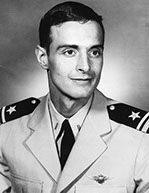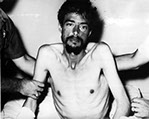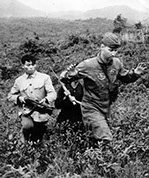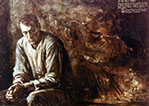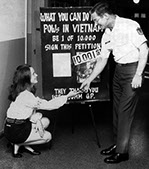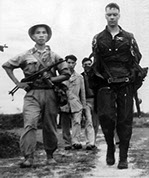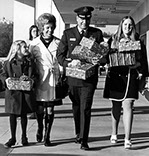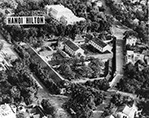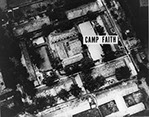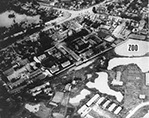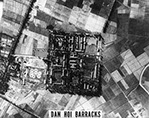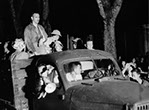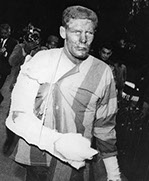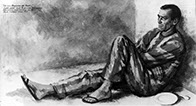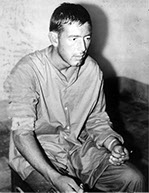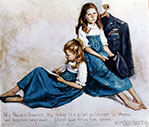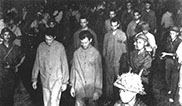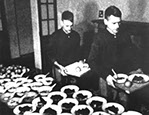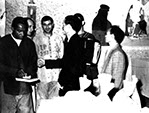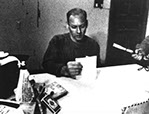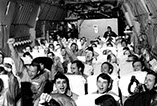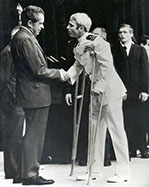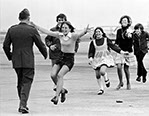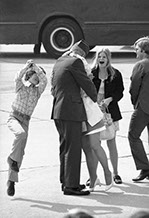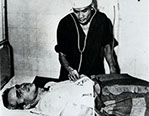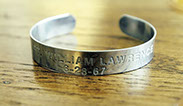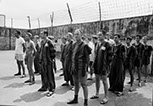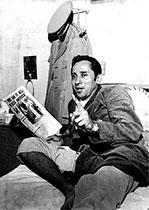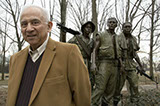
At the tail end of the American entanglement in Vietnam,
a war-weary and divided nation was looking for something
— anything — to feel good about.
By Chris Carroll
Stars and Stripes
Two Men, Two Fates
Gallery
Odyssey
POW Camps
Timeline
The 591 military POWs released by North Vietnam in early 1973 were it.
“We were a plus — a bright spot for the country,” said Tom Hanton, an Air Force fighter pilot freed in late March that year after being held for nine months in Hanoi.
But in the days before “thank you for your service” had become an everyday salutation, the acclaim often didn’t spread further, even though millions of American troops served in Southeast Asia. The enthusiastic welcome home, punctuated by patriotic parades and speeches, was gratifying but left some feeling slightly uneasy.
“Looking back on it, we as POWs were treated as the only heroes of the Vietnam War,” said Tom Hanton, a former Air Force pilot and president of the Association of Vietnam War POWs.
“The others — the guys slugging it out in the jungle —generally didn’t get treated as heroes,” he said. “That was unfair.”
The country’s attitude represented a remarkable U-turn compared to previous wars. Never before had prisoners of war taken on the iconic status conferred on them during the war in Vietnam.

In earlier years, the nation had broadly regarded POWs as unpleasant realities of conflict — and sometimes even representations of cowardice or failure, said Northwestern University historian Michael J. Allen.
“There’s a long tradition in western military history to think of prisoners as having failed, or of being signs of weakness,” said Allen, author of “Until the Last Man Comes Home,” a history of the POW/MIA movement. “After Vietnam, however, the returning POWs were very much regarded as heroes, and given particular honors and awards to recognize their imprisonment and suffering.”
While the prisoners languished in Vietnamese captivity for years and suffered brutal torture, starvation and isolation, a mass movement and letter writing campaign was revving up focused on their welfare.
Many believe the Nixon administration sought to use the frightful experiences of the POWs as ammunition to tar the anti-war movement. Parts of that movement — famously including celebrities who paraded through Hanoi to meet with POWs — were likewise prone to using the prisoners as political props.
From whatever political angle it came, the intense focus on POWs — unprecedented in the history of American warfare— steadily elevated the issue until bringing home the POWs ended up at the top of the popular agenda of war aims.
“In the end, what Nixon tried to do completely backfired on him, because he had created such a base of support for these men in the United States” Allen said. “By the end of the war, he was arguing, ‘We can’t pull out of the war simply to win the release of 500-plus men.' ”

Once the 1973 Operation Homecoming was over, many former POW supporters shifted course slightly to focus on thousands of U.S. servicemembers missing in action in Southeast Asia.
It was a painful political issue would linger for decades amid accusations of abandonment by government bureaucrats eager to leave the Vietnam War in the past. The charge was aired in Congressional hearing rooms as well as on the big screen, where actors Chuck Norris and Sylvester Stallone led fictional missions to rescue living POWs held long after the war.
Reports of white prisoners who were spotted in communist prisons in Southeast Asia, or of shadowy wartime transfers of American officers to Russia in exchange for military assistance, fueled the passion of activists. They include former POW and Navy A-6 pilot Eugene “Red” McDaniel, who was shot down in May 1967 during a bombing mission.
McDaniel’s “backseater” for the mission was Lt. James K. Patterson. Both were in radio contact with U.S. forces after bailing out, but American rescuers were unable to reach either man before being captured. McDaniel returned home with the 591 troops released in 1973, but Patterson seems to have simply disappeared.
For decades, McDaniel has suspected the military and U.S. government knows more than it’s letting on about Patterson and the more than 1,500 Americans still listed as missing in action from Vietnam, and argued for the release of classified records he believes would prove a cover-up.
“If I had known when I was in a prison camp what I know now about all of this, I don’t believe I’d have made it,” McDaniel said.

The previous war in Korea had seen a number of captured troops said to have been “brainwashed” by communist propaganda. The result was the famous Code of Conduct, and it was drilled into troops they were “bound” to give nothing more than basic identifying information to captors.
But the experience of POWs in Vietnam would change the military’s attitude to captivity.
A few heroic POWs died following the code to the letter as they faced an organized torture program in North Vietnamese prison camps. Most found it impossible to fully resist torture, however, and senior POWs modified the code, sending out the word to simply resist as much as possible.
After release, ranking POWs worked with the Pentagon to modify the code to reflect what had been learned in the communist prisons of Vietnam. Some changes were subtle — “I am bound to give name rank, service number and date of birth” was shifted to the less dire “I am required to give…” — but meant plenty to former POWs.
“The word ‘required’ says you give them as little as you can,” said Mike McGrath, a Naval Aviator captured in 1967 and severely tortured. “The word ‘bound’ means you’re going to die.”
The war in Vietnam had another deep psychological effect on the collective military psyche, reflected in greater dedication to recover the bodies of those lost in combat, Allen said.
As a result of Vietnam, he said, there’s a more comprehensive effort to recover MIA troops from World War Two, for instance, than there ever was immediately following the war. Echoes of Vietnam affect current operations as well, he said.
“It’s grown… to the point there have been firefights simply to recover dead soldiers,” Allen said. “That’s a result of a mythos that has grown in the all-volunteer force, that the military will not allow the civilian leadership to abandon it as it believes it was abandoned in Vietnam. The recovery of human remains is an expression of that idea.
The faces of the POW experience: American prisoners of war suffered a great deal at the hands of their North Vietnamese captors. Some came home and rebuilt their lives, some were unable to recover. Some never came home. Browse these photos and afterward share a video montage here.






























